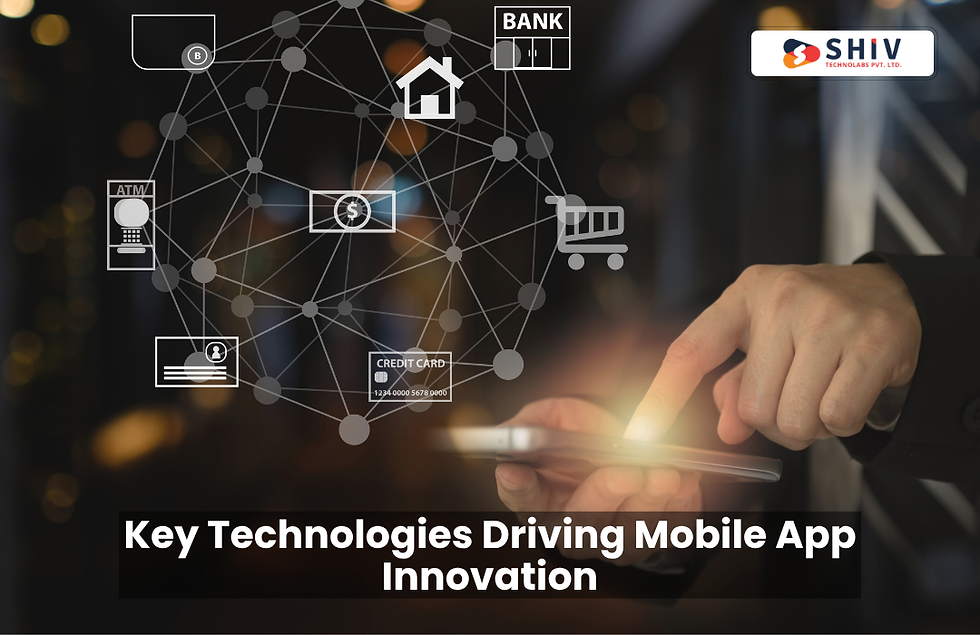Key Technologies Driving Mobile App Innovation
- Kishan Mehta

- Aug 11, 2025
- 5 min read

The mobile app industry has transformed how people work, shop, communicate, and entertain themselves. The growth of technology has introduced new possibilities, making apps more intelligent, faster, and more user-friendly.
Businesses are adopting modern solutions to stay competitive and meet changing user needs. Companies offering mobile app development services in USA are playing a major role in delivering advanced solutions that match evolving demands. Mobile app innovation has become a key driver in shaping industries and improving customer experiences.
This blog explores the most significant technologies shaping mobile app innovation. It explains how each technology works, the industries using it, and the benefits it brings.
Top Innovations Shaping Mobile Apps in USA
Several advanced technologies are shaping the next generation of mobile applications. These solutions enable apps to deliver smarter features, faster responses, and personalized experiences. Businesses across various industries are embracing these tools to meet the evolving expectations of their customers.
Artificial Intelligence and Machine Learning

Artificial Intelligence (AI) and Machine Learning (ML) are at the core of mobile app innovation. These technologies help apps learn from user interactions and make intelligent decisions.
Personalized Experiences: AI analyzes user preferences to provide tailored suggestions. For example, streaming apps suggest content based on viewing history.
Predictive Analytics: ML predicts future behavior, helping businesses offer timely products or services. E-commerce apps use this to recommend items a customer might buy next.
Intelligent Automation: AI chatbots answer customer queries instantly, reducing the need for human support. This improves service quality and reduces response times.
Businesses across retail, healthcare, and finance are integrating AI and ML to boost app performance and user engagement.
Internet of Things (IoT)
IoT connects mobile apps with physical devices, allowing real-time monitoring and control. This is one of the fastest-growing areas of mobile app innovation.
Smart Homes: Apps connect to lighting, security systems, and appliances, giving users remote control through their smartphones.
Healthcare Monitoring: Wearable devices track heart rate, steps, and sleep patterns, sending data to apps for health tracking.
Connected Vehicles: Automotive apps let users start cars, check fuel levels, and locate vehicles remotely.
IoT-based mobile apps offer convenience and data-driven insights that improve daily life.
Augmented Reality (AR) and Virtual Reality (VR)
AR and VR are transforming industries such as gaming, education, healthcare, and retail. They offer interactive and immersive experiences that keep users engaged.
AR in Retail: Shoppers can try products virtually before buying. For example, furniture apps show how an item will look in a home.
VR in Education: Students experience interactive lessons, making learning more engaging and memorable.
AR/VR in Healthcare: Doctors use these technologies for surgery simulations and patient education.
AR and VR are gaining momentum as more apps adopt interactive content to improve user satisfaction.
5G Connectivity
The introduction of 5G has opened new possibilities for mobile app innovation. Its high speed and low latency make advanced app functions possible.
Faster Downloads and Streaming: Apps can handle high-definition video streaming without buffering.
Real-Time Gaming: Gamers enjoy smoother multiplayer experiences with minimal lag.
AR and VR Support: 5G allows these technologies to run more efficiently, improving overall performance.
Businesses are building apps that take advantage of 5G’s capabilities, leading to better performance and user experience.
Blockchain Technology

Blockchain is known for its role in cryptocurrency, but its potential in mobile app innovation is much broader.
Security and Transparency: Blockchain stores data in a way that is hard to tamper with, making apps more secure.
Decentralized Apps (dApps): These run on blockchain networks and offer benefits like reduced downtime and improved privacy.
Smart Contracts: These automate agreements, ensuring both parties follow agreed terms without needing a middleman.
Blockchain is being used in sectors like finance, healthcare, and supply chain management.
Cloud Computing
Cloud technology allows apps to store and process data online rather than relying only on the device.
Scalability: Apps can handle more users without performance issues.
Data Storage: Users can access their data from multiple devices without losing progress or files.
Integration with Other Technologies: Cloud services work well with AI, IoT, and analytics tools.
Many US companies rely on cloud-based apps for collaboration, data storage, and improved performance.
Cross-Platform Development Frameworks
Developers often use frameworks like Flutter, React Native, and Xamarin to create apps for multiple platforms.
Faster Development: A single codebase works for both iOS and Android, saving time and resources.
Cost-Effective: Businesses can launch apps faster without building separate versions, which is one of the key factors influencing app cost.
Consistent Performance: Cross-platform apps maintain similar functionality across devices.
This approach is popular among US startups and established companies aiming for wider reach.
Advanced App Security Technologies
As mobile app usage grows, so does the need for strong security. Security is a major factor in mobile app innovation today.
Biometric Authentication: Fingerprint and facial recognition add extra protection to sensitive data.
Data Encryption: Encryption protects user information from hackers and unauthorized access.
Zero-Trust Architecture: This model verifies every request before granting access, reducing risks.
Businesses prioritize security to comply with regulations and protect customer trust.
Impact of These Technologies on USA Businesses
Increased Efficiency: Automation and AI reduce manual work.
Better User Engagement: AR, VR, and personalization create engaging experiences.
Higher Revenue: Better features lead to improved customer satisfaction and repeat usage.
Mobile app innovation is helping US businesses remain competitive in fast-changing markets.
Also read: Beacon App Development
Shiv Technolabs - Your Mobile App Development Partner in USA
If you are looking to build advanced mobile applications that stand out in the US market, Shiv Technolabs can help. Our expert team delivers high-quality mobile app development solutions that meet your unique needs.
We integrate modern technologies like AI, IoT, AR, VR, blockchain, and cloud computing to create apps that perform and impress. Whether you need a new app or want to upgrade an existing one, we ensure it meets your goals and industry standards. Partner with Shiv Technolabs for mobile app solutions that drive results.
Conclusion
The USA continues to lead in mobile app innovation due to the rapid adoption of modern technologies. AI, IoT, AR, VR, 5G, blockchain, cloud computing, and security advancements are shaping the future of mobile apps.
Businesses that invest in these technologies can improve user experience, gain customer trust, and achieve lasting success.
As technology continues to advance, mobile apps will become even more intelligent, connected, and interactive. Companies that embrace these changes will have the best chance of succeeding in a highly competitive environment. Contact us to discuss how we can help bring your mobile app vision to life.




Khelraja brings the thrill of online slots to life with a wide variety of exciting themes and seamless gameplay. Spin the reels anytime, anywhere, and enjoy top-tier graphics, fair payouts, and engaging bonuses. Whether you’re new or experienced, Khelraja makes online slots entertaining and rewarding for every player seeking nonstop action.
https://guyajeunejob.com/read-blog/42742
https://blog.rackons.in/why-choosing-an-extended-warranty-for-your-electronics-is-smart-powered-by-warrantysco
https://www.chrisweaverband.com/profile/seemawarrantys18288/profile
https://www.cqcinvestigations.co.uk/buy-extended-warranty-in-india-the-smart-way-why-warrantys-co-is-the-go-to-choice/
https://doorspell.com/blogs/28229/Buy-Extended-Warranty-in-India-the-Smart-Way-Why-Warrantys
API Connects is a leading cloud migration solutions that supports enterprises with data, cloud, API, and AI driven solutions. Consult our engineers for digital transformation.
Companies are focusing on better customer support to stay competitive, and reliable solutions are at the center of that effort. Investing in call center systems in Houston Texas allows businesses to streamline communication, improve response times, and enhance customer satisfaction. With advanced call center systems in Houston Texas, organizations can scale operations while keeping service quality high.